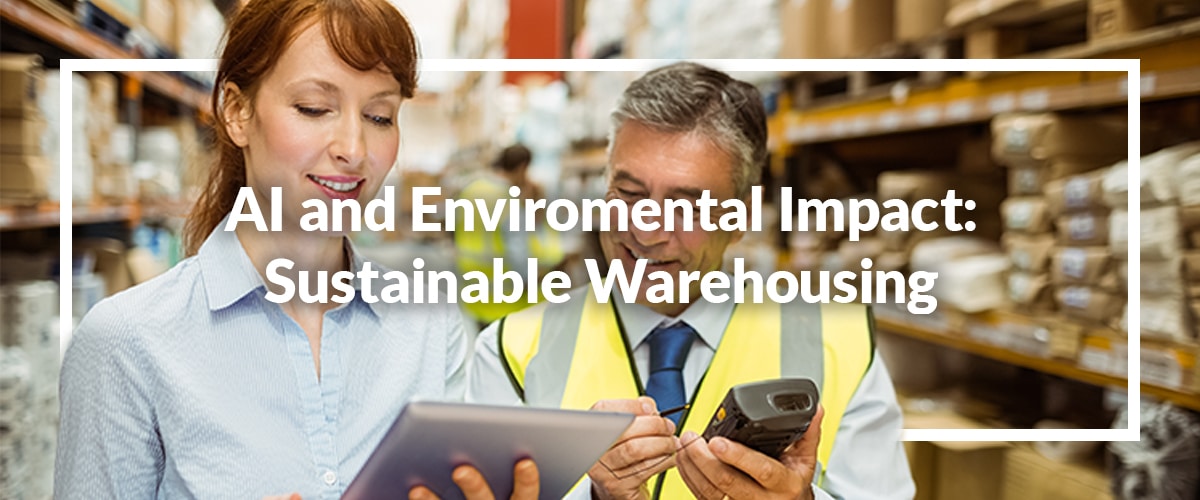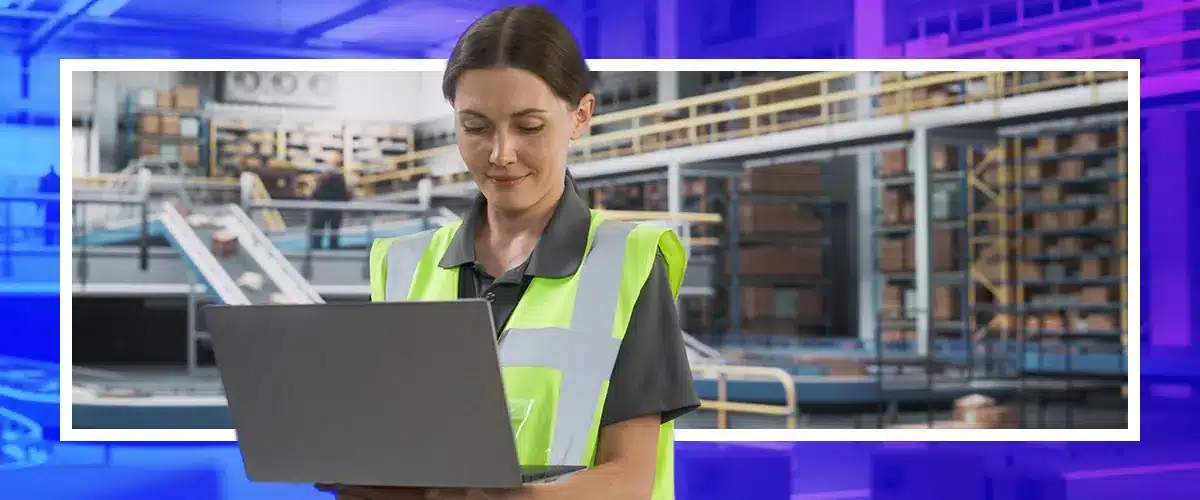Artificial Intelligence (AI) can significantly reduce the energy consumption and environmental impact of warehouse operations to support these goals. This blog delves into the transformative role of AI-driven fulfillment technology in achieving sustainable warehousing and greener supply chain logistics.
Contents
- Consumer-Centric Fulfillment and Sustainability
- The Intersection of AI and Environmental Impact in Warehousing
- Key Technologies for Sustainable Warehousing
- Sustainable Supply Chain Management: The Broader Perspective
- AI-Enhanced Sustainability: Beyond Warehousing
- FAQs Related to AI and Environmental Impact in Warehousing
Key Takeaways
- Sustainable supply chain logistics have become a crucial strategy for cost reduction, operational efficiency, and customer loyalty—with 85% of consumers preferring greener shopping practices.
- AI-driven warehouse methods (e.g. AI job optimization, order routing, inventory management, etc.) minimize energy consumption and waste caused by fulfillment logistics.
- AI helps minimize material waste and aligns shipping practices with eco-friendly fulfillment goals to reduce environmental impact.
- AI-driven WMS and FMS solutions play a key role in helping warehouses achieve greener supply chain operations.
Consumer-Centric Fulfillment and Sustainability
For brands, retailers, online sellers, and third-party logistics providers (3PLs), the pursuit of sustainable supply chain logistics transcends traditional motivations like shifting values and regulatory compliance. It has emerged as a critical strategy for achieving cost reduction, operational efficiency, and customer loyalty.
According to Reuters, 85% of today’s consumers are taking a ‘greener’ approach to shopping. This underscores the growing importance of sustainability in meeting consumers’ expectations and ensuring long-term market success.
By optimizing operational efficiency and reducing environmental impact, businesses are able to align more closely with the values of their customers. This is crucial to remaining relevant and competitive in a future where sustainability is not just preferred but expected.
The Intersection of AI and Environmental Impact in Warehousing
Artificial Intelligence (AI) is more than a technological advancement; it is a strategic asset for fostering consumer-centric initiatives and sustainable logistics. The integration of AI into warehousing operations helps significantly with both of these goals by enabling businesses to optimize their logistics processes in a variety of ways.
From analyzing demand to ensuring more energy-efficient warehouse processes, AI is at the forefront of driving eco-friendly innovations in the logistics sector. The transition towards AI-enhanced warehousing technology is not just a testament to the potential for greener operations but also sets a new standard for the industry.
Key Technologies for Sustainable Warehousing
AI’s capability to analyze vast datasets and predict outcomes with remarkable accuracy is a game-changer for sustainable warehousing. By optimizing processes like picking and packing, inventory management, and order routing, AI streamlines operations while significantly reducing the carbon footprint of high-volume fulfillment.
Let’s take a closer look at the AI-driven warehouse management tools being used today and how they drive positive change.
AI Job Optimization: A Catalyst for Sustainable Warehousing
AI-driven job optimization revolutionizes the way warehouse tasks are performed, from inventory stocking to order fulfillment. By examining orders, SKU quantities and sizes, storage rules, inventory levels, and available labor—AI algorithms are able to categorize and prioritize orders for optimum efficiency.
This process minimizes the total number of locations and times warehouse employees have to visit locations. It also ensures continuous operations that can incorporate new orders and problem-solve in real-time. In fact, Logiwa users have realized up to 58% efficiency gain with AI-driven jobs. As a result, operations are carried out with the maximum precision, speed, and minimal waste.
Picking Route Optimization: The Path to Reduced Energy Consumption
One of the most significant ways AI contributes to sustainable warehousing is through route optimization. Traditional picking and replenishment methods often involve redundant paths and inefficient item retrieval processes, leading to unnecessary energy expenditure.
AI algorithms can analyze warehouse layouts to devise the most efficient routes for executing jobs, drastically reducing the distance traveled by workers or robots. This directly translates to lower energy usage and a smaller carbon footprint, aligning warehousing operations with sustainable practices.
Inventory Management: Minimizing Waste through Precision
Effective inventory management is crucial for sustainable warehousing. Overstocking leads to increased energy consumption for storage and a higher risk of waste (e.g. expired goods), while understocking results in additional transportation emissions due to emergency restocking.
AI-driven inventory management systems can predict demand with high accuracy, ensuring that stock levels are optimized to meet demand without excess. This precision reduces the need for energy-intensive storage and transportation, making warehousing operations more sustainable.
Order Routing: Streamlining for Sustainability
Order routing, the process of determining the most efficient facility and travel path for order fulfillment, is another area where AI makes a significant impact. By analyzing factors such as order size, destination, and carrier efficiency, AI algorithms can identify the most sustainable shipping methods.
This not only reduces transportation emissions but also ensures faster delivery times, enhancing customer satisfaction while adhering to sustainable practices. In combination with features like carrier rate shopping tools, operations can save on shipping costs to further enhance their sustainability efforts.
AI-Driven Robotics: Increasing Energy Efficiency
Robots guided by AI algorithms can navigate warehouses more efficiently than humans, reducing the time and energy required for picking and placing items. By operating continuously and maintaining consistent speeds, robots lower energy consumption as well.
Moreover, since the operational requirements for robots differ from human workers, the deployment of robots can decrease the need for extensive lighting and climate control systems at certain times or warehouse locations. This cuts down on energy consumption and minimizes the wear and tear on warehouse infrastructure, further contributing to sustainability efforts.
Sustainable Packaging: The AI Advantage
Sustainable packaging is an integral component of eco-friendly fulfillment. AI can play a pivotal role in optimizing packaging design and material selection, ensuring that products are protected with the minimum necessary packaging.
AI helps in identifying the most appropriately sized container based on order items’ dimensions. By selecting the smallest container, orders can be packaged compactly with as few packaging materials and fillers as possible. This reduces material waste and lowers emissions by optimizing packing space within transportation vehicles and the number of orders delivered with each shipment.
Related Content: How to Become a Sustainable Warehouse Operation
Sustainable Supply Chain Management: The Broader Perspective
Through smarter inventory management, energy use optimization, and waste reduction, AI-powered logistics are paving the way for a future where sustainable practices are integral to overcoming supply chain challenges.
A dedicated approach to sustainability through AI not only meets the current needs of the planet but sets a foundation for long-term supply chain success and growth.
Energy Efficient Warehousing
Energy efficiency is paramount in sustainable supply chains. AI technologies, such as smart lighting systems and climate control, can dynamically adjust based on real-time warehouse activity, significantly reducing energy consumption in the overarching supply chain. Furthermore, AI-driven predictive maintenance ensures that equipment operates at peak efficiency, preventing energy wastage and the need to replace malfunctioning or inefficient machinery.
Sustainable Supply Chains
Sustainable warehousing is a critical element of the broader sustainable supply chain ecosystem. AI-driven sustainability in warehousing contributes to the overall reduction of the supply chain’s environmental impact. By optimizing warehousing operations, AI helps create a more dependable, efficient, and environmentally responsible supply chain.
Greener Industry Sectors
The impact of AI on sustainability extends beyond warehousing. By enabling more efficient operations, AI contributes to a reduction in the overall environmental impact of many industry sectors. The insights gained from AI-driven warehousing operations can inform broader sustainability strategies, paving the way for more efficient practices across industries like manufacturing and shipping.
Related Content: The Sustainable Supply Chain: AI and Automation for a Green Warehouse
AI-Enhanced Sustainability: Beyond Warehousing
AI’s role in refining warehousing operations has set off a domino effect that is changing consumer expectations and the logistics sector as a whole. It’s transforming individual facilities and helping sustain streamlined, environmentally friendly supply chains on a global level.
The rise of sustainable logistics underscores the importance of AI-driven optimization across all facets of warehouse and supply chain management. In order to achieve this, operations need to be equipped with AI-backed solutions. That’s where modern fulfillment management systems come in.
As we move forward, the adoption of AI in warehousing operations will be pivotal in achieving sustainable, high-volume fulfillment success. Modern warehouse management systems (WMS) and fulfillment management systems like Logiwa IO make it easy to transition to greener operations.
Fulfillment Management Systems (FMS) for Sustainable Warehousing
From the moment an order is placed to the moment it leaves your warehouse doors, Logiwa IO leverages the power of AI to help you run efficient operations. Our solution maximizes operational visibility, efficiency and accuracy, giving you the control you need to implement eco-minded workflows and sustainable automation.
Our analytics and reporting tool makes it easy to root out inefficiencies and optimize eco-friendly practices related to order processing and material-use. In addition, our AI job optimization, inventory management, and shipping functions enhance efficiency and order accuracy. This leads to fewer returns, cost-savings, and reduced waste—all of which contribute to environmental impact.
The integration of AI into warehousing operations heralds a new era of sustainable warehousing. Learn more at: www.logiwa.com/why-logiwa.
FAQs Related to AI and Environmental Impact in Warehousing
How does AI contribute to sustainable warehousing?
AI significantly enhances sustainable warehousing by optimizing operations to reduce waste, energy consumption, and carbon emissions. Through intelligent algorithms, AI enables precise inventory management, efficient route planning for picking and packing, and the use of AI-driven robotics, all of which contribute to a greener supply chain ecosystem. This not only supports eco-friendly fulfillment but also aligns with the growing consumer demand for sustainability in the products and services they choose.
Can AI improve sustainable packaging practices?
Absolutely. AI plays a crucial role in advancing sustainable packaging within warehousing operations. By analyzing product dimensions and order configurations, AI algorithms can identify the most appropriately sized packaging for each order, minimizing the use of materials and reducing waste. This optimization ensures products are shipped with the least amount of packaging necessary, contributing to more eco-friendly fulfillment practices and reducing the environmental impact of shipping and handling.
How does AI influence green logistics solutions and sustainable fulfillment strategies?
AI is at the heart of developing green logistics solutions and sustainable fulfillment strategies by providing data-driven insights that enable more efficient use of resources. It enhances energy efficiency in warehousing through smart systems that control lighting, heating, and cooling based on real-time needs. Furthermore, AI-driven predictive maintenance ensures equipment operates optimally, preventing unnecessary energy use. By streamlining operations and reducing resource consumption, AI supports the broader goals of sustainable supply chains and eco-friendly fulfillment.
What types of WMS features help with sustainability?
Warehouse Management Systems (WMS) enhance sustainability through features like AI job optimization, efficient inventory management, advanced analytics, and shipping automation features. They optimize inventory to prevent waste, streamline picking routes for operational efficiency, and support sustainable packaging by determining the most efficient packaging configurations.
Additionally, WMS facilitate paperless operations, reducing paper waste and improving process efficiency and accuracy. Integrated data analytics enable continuous monitoring and improvement of sustainability metrics, ensuring warehouses can effectively reduce their environmental impact while maintaining high operational standards.
Logiwa revolutionizes fulfillment with its AI-powered, cloud-based solutions, designed for high-volume networks, direct-to-consumer brands, and 3PLs
Warehouse Management
Modern digital WMS powers a modern fulfillment experience






